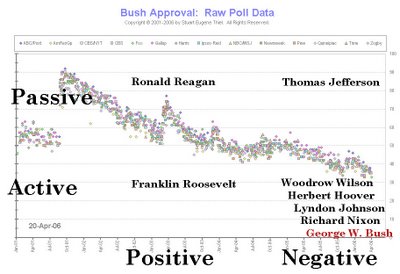The Active/Negative President
 Click to enlarge.
Click to enlarge.John Dean has an interesting post at Common Dreams. He takes a look at the study by political scientist James Dave Barber who categorized presidents as active or passive and as positive or negative.
From these measurements, Barber developed four repeating categories into which he was able to place all presidents: those like FDR who actively pursued their work and had positive feelings about their efforts (active/positives); those like Nixon who actively pursued the job but had negative feelings about it (active/negatives); those like Reagan who were passive about the job but enjoyed it (passive/positives); and, finally, those who followed the pattern of Thomas Jefferson -- who both was passive and did not enjoy the work (passive/negatives).
Interestingly, the category of presidents who proved troublesome under Barber's analysis is that of those who turned out to be active/negatives. Barber placed Woodrow Wilson, Herbert Hoover, Lyndon Johnson and Richard Nixon in this class.
In my prior column, I found that the evidence is overwhelming that George W. Bush is another active/negative president, and the past two years, since making that initial finding, have only further confirmed my conclusion.
Because active/negative presidencies do not end well, it is instructive to look at where Bush's may be heading.
Bush's 'Active/Negative' Presidency
Recent events provide an especially good illustration of Bush's fateful - perhaps fatal - approach. Six generals who have served under Secretary of Defense Rumsfeld have called for his resignation - making a strong substantive case as to why he should resign. And they are not alone: Editorialists have also persuasively attacked Rumsfeld on the merits.
Yet Bush's defense of Rumsfeld was entirely substance-free. Bush simply told reporters in the Rose Garden that Rumsfeld would stay because 'I'm the decider and I decide what's best.' He sounded much like a parent telling children how things would be: 'I'm the Daddy, that's why.'
This, indeed, is how Bush sees the presidency, and it is a point of view that will cause him trouble.
Bush has never understood what presidential scholar Richard Neustadt discovered many years ago: In a democracy, the only real power the presidency commands is the power to persuade. Presidents have their bully pulpit, and the full attention of the news media, 24/7. In addition, they are given the benefit of the doubt when they go to the American people to ask for their support. But as effective as this power can be, it can be equally devastating when it languishes unused - or when a president pretends not to need to use it, as Bush has done.
Apparently, Bush does not realize that to lead he must continually renew his approval with the public. He is not, as he thinks, the decider. The public is the decider.
Hat tip to Stuart Eugene Thiel at Pollkatz for the background graphic.




0 Comments:
Post a Comment
<< Home